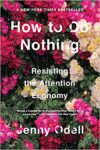
by Jenny Odell, 2019
Too many big words and thoughts! This young lady is just too smart! She doesn’t appear to believe in God so all of her deep philosophizing is for naught because, “Unless the Lord builds the house, those who build it labor in vain.” Psalm 127:1
Without reading the book, Wayne predicted what it would be about, and it really would have made a lot more sense with this framework:
Thoughtful Resistance
-Saying “NO” to anger, fear, mindless drivel, and unreasoned consumption
-Saying “YES” to Philippians 4:8, “Finally, brothers and sisters, whatever is true, whatever is noble, whatever is right, whatever is pure, whatever is lovely, whatever is admirable—if anything is excellent or praiseworthy—think about such things.“
She’s writing about how to resist the “attention economy,” which is how social media giants like Facebook and Twitter have commandeered our attention and we’re missing the real world while we constantly check our phones for the latest media frenzy. As I write this, the latest media frenzy is the corona virus; we’ve moved on from politics (Trump and the Democrats and Super Tuesday). She loves birds and bird-watching and she recommends getting outside in parks and natural areas. Bird-watching does slow you down and you start to notice things you have never noticed before and the world does become much more interesting and beautiful. I like the stories she tells in between the philosophizing; describing art and artists, birds and bird-watching, parks and natural areas, and the history of communes (that all failed to find Utopia and instead became a living hell for their members).
Here are some examples of sentences that make no sense to me:
“In a time when meaningful action will require us to form new alliances and recognize differences at the same time, bioregionalism is also useful as a model of difference without boundary, a way of understanding place and identity that avoids essentialism and reification.”
And here’s another one:
“Basically, the space of appearance is an encounter small and concentrated enough that the plurality of its actors is un-collapsed.”
See what I mean?
There are some parts of the book that are understandable. Here is an example:
Here’s what I want to escape. To me, one of the most troubling ways social media has been used in recent years is to foment waves of hysteria and fear, both by news media and by users themselves. Whipped into a permanent state of frenzy, people create and subject themselves to news cycles, complaining of anxiety at the same time that they check back ever more diligently. The logic of advertising and clicks dictates the media experience, which is exploitative by design. Media companies trying to keep up with each other create a kind of “arms race” of urgency that abuses our attention and leaves us no time to think. The result is something like the sleep-deprivation tactics the military uses on detainees, but on a larger scale. The years 2017 and 2018 were when I heard so many people say, “It’s just something new every day.”
And here’s what she says it takes to resist the attention economy:
Voluntate, Studio, Disciplina – it is through these things that we find and inhabit the third space, and more important, how we stay there.
She doesn’t do a very good job of defining these three, or at least as far as I could tell, so here are their definitions:
Voluntate – willfulness
Studio – eagerness
Disciplina – discipline
I liked this definition of attention:
It’s here that I want to come back to the relationship between discipline and attention from the previous chapter. An element of effort and straining exists in the word attention itself, which comes from Latin ad + tendere, “to stretch toward.”
She then quotes from William James’s 1890 The Principles of Psychology who quotes the physicist and physician Hermann von Helmholtz:
“The natural tendency of attention when left to itself is to wander to ever new things; and so soon as the interest of its object is over, so soon as nothing new is to be noticed there, it passes, in spite of our will, to something else. If we with to keep it upon one and the same object, we must seek constantly to find out something new about the latter, especially if other powerful impressions are attracting us away.”
She has a chapter called Exercises In Attention and she quotes James Williams:
We experience the externalities of the attention economy in little drips, so we tend to describe them with words of mild bemusement like “annoying” or “distracting.” But this is a grave misreading of their nature. In the short term, distractions can keep us from doing the things we want to do. In the longer term, however, they can accumulate and keep us from living the lives we want to live, or, even worse, undermine our capacities for reflection and self-regulation, making it harder, in the words of Harry Frankfurt, to “want what we want to want.” Thus there are deep ethical implications lurking here for freedom, wellbeing, and even the integrity of the self.
I’ll end here with Ephesians 6:12:
“For our struggle is not against flesh and blood, but against the rulers, against the authorities, against the powers of this dark world and against the spiritual forces of evil in the heavenly realms.”
And also Sherry’s email signature tag line:
“To not pay attention is to miss the wonder of being alive. Bob Welch”